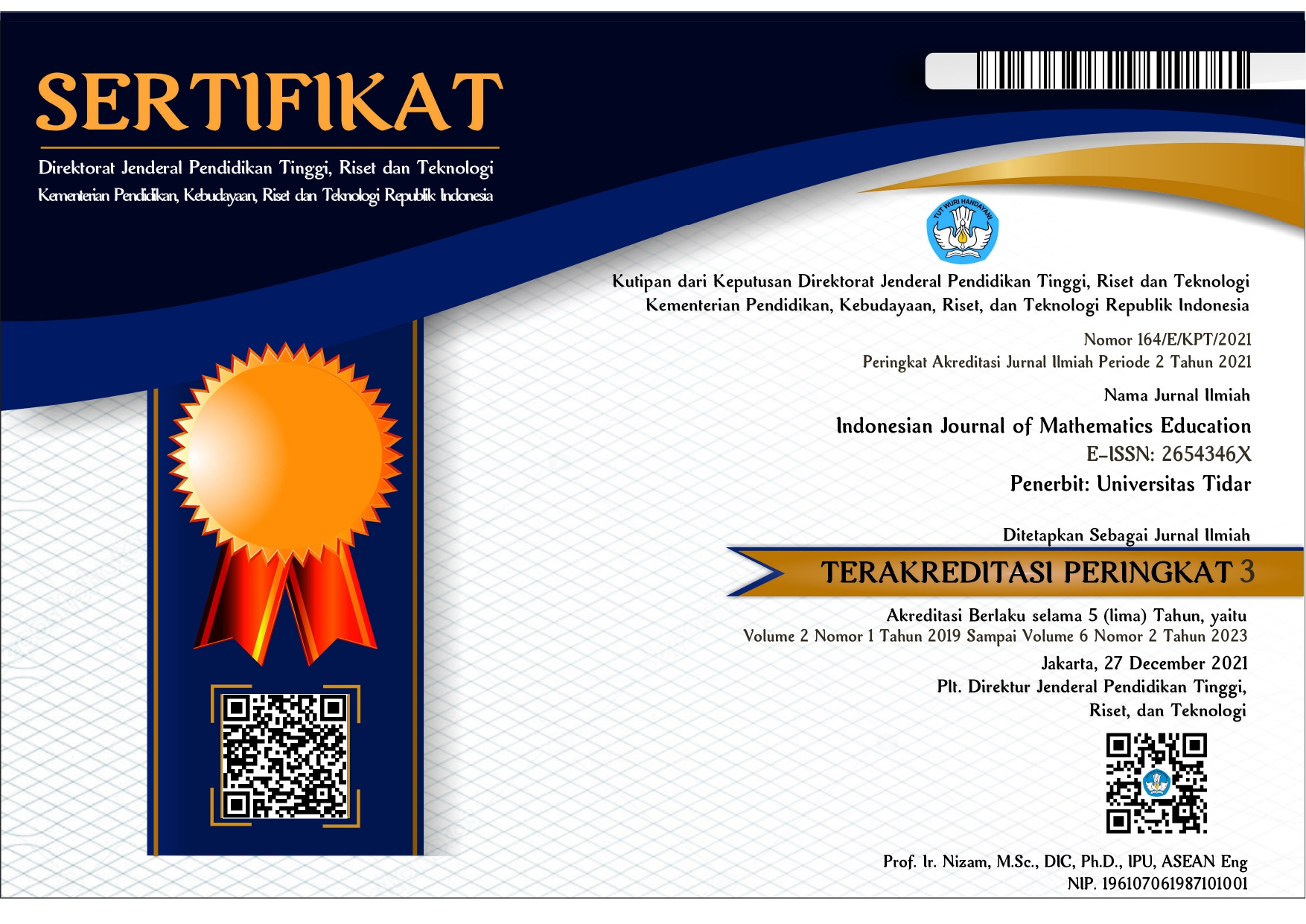Relationship between Academic Self-Concept and Academic Performance in Mathematics of Secondary School Students in Delta State, Nigeria
Keywords:
Academic self-concept, academic performance, Delta state, mathematicsAbstract
The study investigated the relationship between self-concept and the academic performance in mathematics of secondary school students in Delta State, Nigeria. Two research questions and two null hypotheses guided the study. A correlation design was adopted in the study. All 42,299 senior secondary two (SS2) mathematics students in the 2021/2022 session in the state made up the research population. A multistage sampling procedure was used to draw 1,650 of these students. The instrument utilized to gather data was the Academic Self-Concept Questionnaire (ASQ), which was validated by three experts. The instrument's dependability was determined using Cronbach’s Alpha, and the result was 0.68. The students’ performances in Mathematics for three terms in SS1 represent their performance scores in mathematics. The collected data were analyzed using Pearson product moment correlation and a t-test for correlation analysis. The results of the study showed a very low positive and no significant relationship between academic self-concept and the performance of secondary school students in mathematics. However, there was a significant difference in relation to mathematics performance between students with a positive self-concept and those with a negative self-concept in mathematics. In light of the results, it was recommended among other things, that mathematics teachers should make a deliberate effort to help students who possess negative self-concepts by conditioning, modeling, and changing their behaviors to perform better in mathematics.
References
Adown, M. (2016). Students’ attitude and self-concept as correlates of their achievement in senior secondary school mathematics in
Ankpa local government area of Kogi state. Unpublished Thesis, University of Nigeria, Nsukka. https://oer.unn.edu.ng/read/students-attitude-and-self-concept-as-correlates-of-their-achievement-in-senior-secondary-school-mathematics-in-ankpa-local-government-area-of-kogi-state
Ajmal, M. & Rafique, M. (2018). Relationship between academic self-concept and academic achievement of distance learners. Pakistan Journal of Distance and Online Learning, 4(2), 225-244. https://doi.org/10.30971/pjdol.v4i2.449
Ajunwo, F. O. (2018). Self-concept and academic achievement of undergraduate business education students in Rivers State. International Journal of Innovative Psychology & Social Development, 6(3), 6-17. https://seahipaj.org/journals-ci/sept-2018/IJIPSD/full/IJIPSD-S-2-2018.pdf
Farrington, C. A., Roderick, M., Allensworth, E., Nagaoka, J., Keyes, T. S., Johnson, D. W & Beechum, N. O. (2012). Teaching Adolescents to Become Learners: The Role of Noncognitive Factors in Shaping School Performance--A Critical Literature Review. Consortium on Chicago School Research. 1313 East 60th Street, Chicago, IL 60637.
Izuchi, M-R. N. & Onyekuru, B.U. (2017). Relationships among academic self-concept, academic motivation and academic achievement among college students. European Journal of Research and Reflection in Educational Sciences, 5(2), 93-102.
Jaiswal, S. K., & Choudhuri, R. (2017). Academic self-concept and academic achievement of secondary school students. American Journal of Educational Research, 5(10), 1108-1113. http://pubs.sciepub.com/education/5/10/13/index.html
James, B. O., Tawanda, R., Ndileleni, M., Hasina, C. & Shonisani, A. M. (2021). An examination of the correlation between South African grade12 students’ mathematics self-concept and their academic achievement. International Journal of Learning, Teaching and Educational Research, 20(12), 127-138. https://doi.org/10.26803/ijlter.20.12.8
John, E. L, Abdul-Jaleel, S. & Dawson-Brew, E. (2014). Influence of student self-concept on their academic performance in Elmina Township. European Journal of Research and Reflection in Educational Sciences, 2(4), 1-10. https://www.idpublications.org/wp-content/uploads/2014/09/INFLUENE-OF-STUDENTS-SELF-CONCEPT-ON-THEIR-ACADEMIC-PERFORMANCE-IN-THE-ELMINA-TOWNSHIP.pdf
Kamoru, U., & Ramon, O. G. (2017). Influence of self-concept, study habit, and gender on attitude and achievement of secondary school students in mathematics. Journal for Leadership and Instruction, 16(1),49-52. https://www.scopeonline.us/wp-content/uploads/2019/01/Spring-2017-Final.pdf
Kumari, A. N., & Chamundeswari, S. (2013). Self-concept and academic achievement of students at the higher secondary level. Journal of Sociological Research, 4(2), 105-113. http://dx.doi.org/10.5296/jsr.v4i2.3909
Marsh, H. W., & Martin, A. J. (2011). Academic self-concept and academic achievement: Relations and causal ordering. British Journal of Educational Psychology, 81(1), 59-77. https://doi.org/10.1348/000709910X503501.
Nalah, A. B. (2014). Self-concept and students’ academic performances in college of education, Akwanga, Nassarawa State, Nigeria. World Journal of Young Researchers, 3(2), 32-37.
National Bureau of Statistics (2019). WAEC Results Statistics (2016-2018). https://education.gov.ng/2016-2018-waec-results-statistics-by-nbs
Njoku, I. O. & Okigbo, E. C. (2021). Emotional intelligence and academic self- concept as predictors of secondary school students’ achievement in Mathematics Imo. African Journal of Science, Technology & Mathematics Education (AJSTME), 6(1), 174-184.
https://www.ajstme.com.ng/volume.php?id=14
Nworgu, B. G. (2015): Educational Research: Basic Issues & Methodology 2nd Edition. University Trust Publishers, Nsukka.
Obilor, I. E. (2011). Relationship between self-concept and mathematics achievement of senior secondary students in Port Harcourt Metropolis. Journal of Educational and Social Research, 1(4), 39-46. https://www.richtmann.org/journal/index.php/jesr/article/view/11744
Oluwatayo, J. A. (2011), Self-concept and performance of secondary school students in mathematics. Journal of Educational and Developmental Psychology, 1(1), 176-183. http://dx.doi.org/10.5539/jedp.v1n1p176
Parveez, A. L., & Tariq, A. L. (2016). A study on relation between self-concept and academic achievement among secondary school students of Jammu District. Journal of Education and Practice, 7(31), 19-23. https://iiste.org/Journals/index.php/JEP/article/view/34085
Peteros, E., Gamboa, A., Etcuban, J. O., Dinauanao, A., Sitoy, R., & Arcadio, R. (2019). Factors affecting mathematics performance of junior high school students. International Electronic Journal of Mathematics Education, 15(1), 1-13. https://doi.org/10.29333/iejme/5938
Tang, S-F. (2011). The relationships between self-concept, academic achievement and future pathway of first year business studies diploma students. International Journal Psychological Studies, 3(2), 123-130. http://dx.doi.org/10.5539/ijps.v3n2p123
Published
How to Cite
Issue
Section
Copyright (c) 2023 Indonesian Journal of Mathematics Education

This work is licensed under a Creative Commons Attribution-NonCommercial-ShareAlike 4.0 International License.









